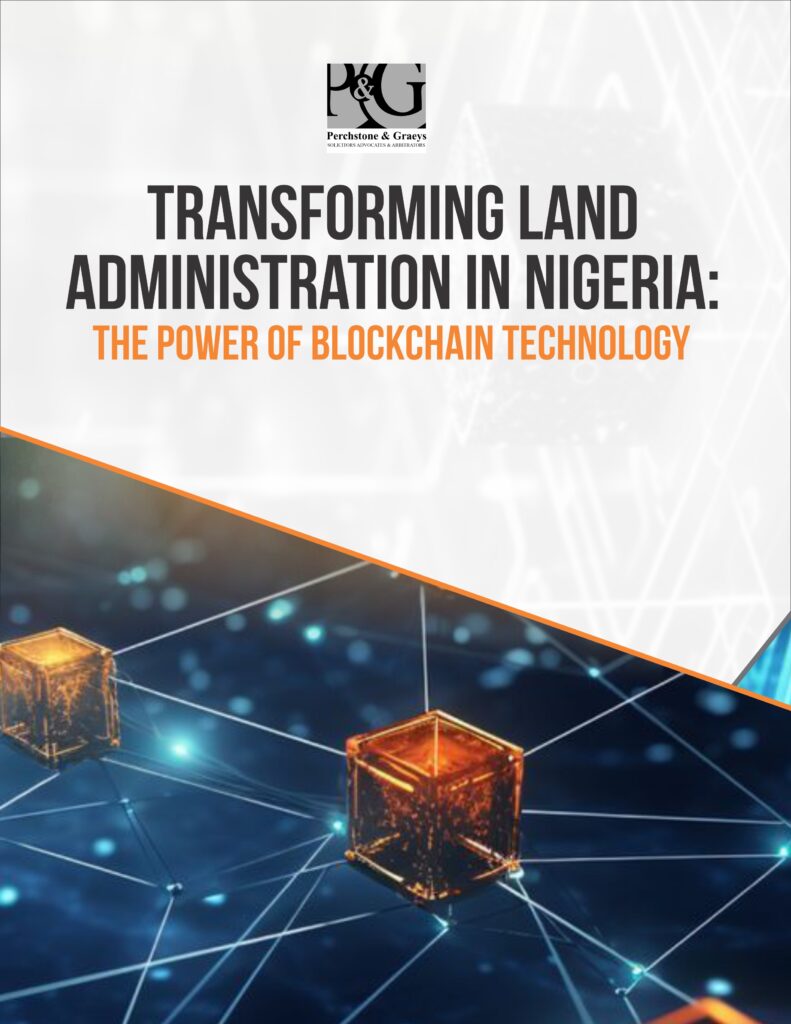In Nigeria, the complex nature of land administration presents a challenge that hinders economic growth and the optimal utilization of land resources. The process encompasses a variety of activities such as land acquisition, surveying, mapping, registration, and the issuance of titles. Efficient land administration is fundamental to unlocking the real estate sector’s full potential, attracting investment, and driving sustainable development. Unfortunately, the current system faces significant challenges that prevent it from functioning effectively. Outdated practices, transparency issues, and susceptibility to fraud are all obstacles that have underscored the need for a transformative solution. Blockchain technology offers a groundbreaking alternative with the potential to redefine land administration in Nigeria, providing a platform that emphasizes transparency, security, and efficiency.
The traditional model for land administration in Nigeria relies heavily on manual processes, which include storing land records in paper files, conducting searches manually, and processing transactions through physical paperwork. This outdated system is fraught with delays, inaccuracies, and a lack of transparency, contributing to an environment that often lacks accountability. These deficiencies not only erode public trust but also create conditions ripe for corruption and fraudulent practices. Inefficiencies within the system discourage investment, facilitate illegal land grabbing, and undermine confidence in the integrity of land ownership records. Addressing these issues has become essential to fostering economic growth and ensuring the equitable distribution of land resources.
In recent years, some Nigerian states have made strides toward digitizing land records. States like Lagos, Ogun, Kaduna, Enugu, and Abuja have led the way by converting a significant portion of their land records into digital formats. This effort includes creating digital maps, issuing electronic Certificates of Occupancy, and storing records on central servers. While digitization represents progress, central server-based systems remain vulnerable to single points of failure. A prominent example of this vulnerability emerged during Nigeria’s 2023 election when the Independent National Electoral Commission (INEC) faced significant challenges in uploading results due to technical issues with its central server. This incident highlights the limitations of a centralized model and underscores the need for more robust, decentralized solutions to safeguard critical data.
Blockchain technology offers a promising alternative by leveraging its decentralized nature to enhance the security, transparency, and efficiency of land administration systems. As a distributed ledger system, blockchain records transactions across a network of computers, ensuring that data is not only accurate but also tamper-proof. Unlike centralized servers, blockchain technology eliminates single points of failure, safeguarding data integrity and enhancing resilience. Through its decentralized structure, blockchain minimizes the risks associated with data breaches and unauthorized access, protecting ownership records and ensuring that all transactions are secure and verifiable. The technology is built on advanced encryption protocols, which provide additional layers of security and prevent data manipulation.
Beyond simply registering land titles, blockchain technology can streamline the entire land administration process through features such as smart contracts. Smart contracts are self-executing agreements in which the terms are directly written into code. They automatically execute transactions when specified conditions are met, eliminating the need for intermediaries and increasing efficiency. For instance, a smart contract could facilitate a land transaction by transferring ownership and securing payment in real time once all prerequisites are met. This capability not only expedites transactions but also reduces the likelihood of fraud. In addition to smart contracts, blockchain enables the digitization of land ownership through tokenization. By representing land assets as digital tokens, blockchain allows for seamless transfer, fractional ownership, and division of property. This opens new investment opportunities in the real estate sector, from fractional ownership models to property derivatives, which can drive innovation and diversification within the market.
The implementation of blockchain technology within land administration systems offers far-reaching benefits for stakeholders across the real estate ecosystem. Landowners gain enhanced security and can use their digital titles as collateral for loans, while developers benefit from accurate and accessible land records that reduce project risk. Investors gain access to real-time market data, enabling them to make informed decisions and minimize risks. Financial institutions can streamline their mortgage and loan issuance processes with reliable land title information, while government agencies see improvements in efficiency, reductions in corruption, and enhancements in public trust. Additionally, by integrating blockchain technology, litigants can reduce disputes and litigation costs through the automation provided by smart contracts. Insurance companies also benefit by having access to verified land ownership records and title history, which improves underwriting accuracy and mitigates risks.
However, while the benefits of blockchain technology are evident, the initial costs associated with its implementation can pose a challenge. To overcome this hurdle, innovative funding solutions are necessary. One potential approach is securitization, which involves the creation of tradable securities based on projected revenue streams from blockchain-based land administration services. For example, future property tax revenues or land registration fees could be packaged as securities, attracting investors seeking steady returns. Such an approach not only funds blockchain projects but also presents an appealing investment opportunity for the private sector. Public-private partnerships (PPPs) represent another effective model for financing blockchain implementation. Through collaboration, government agencies and private sector entities can develop blockchain solutions for land administration that leverage both parties’ strengths. In these partnerships, private companies contribute technological expertise and resources, while government agencies provide access to land data and regulatory support. PPPs foster a collaborative environment that promotes innovation and accelerates the development of blockchain-based systems.
Several countries have already demonstrated the viability of blockchain technology in land administration. Sweden, Georgia, and Dubai have successfully integrated blockchain solutions to enhance efficiency, transparency, and economic growth within their real estate sectors. Nigeria can draw from these examples, applying lessons learned to build a more resilient land administration system. Encouragingly, Nigeria has taken its first step toward adopting blockchain technology through the Federal Government’s approval of the National Blockchain Policy on May 3, 2023. This policy sets a solid foundation for harnessing the advantages of blockchain technology, positioning Nigeria as a leader in digital transformation within Africa.
The integration of blockchain technology into Nigeria’s land administration system represents a pivotal opportunity to drive economic development, foster transparency, and enhance security. As the country moves toward a more digital and resilient infrastructure, blockchain offers the tools needed to address longstanding issues within the land administration sector. With this technology, Nigeria can create a modern, efficient, and transparent system that benefits all stakeholders and contributes to sustainable economic growth. By embracing blockchain, Nigeria can unlock the full potential of its land resources, ultimately paving the way for a more prosperous and equitable future for all.
This article was written by Ugochukwu Obi, Partner, and Omolade Afonja, Intermediate Associate, of Perchstone & Graeys, LP.
4o


